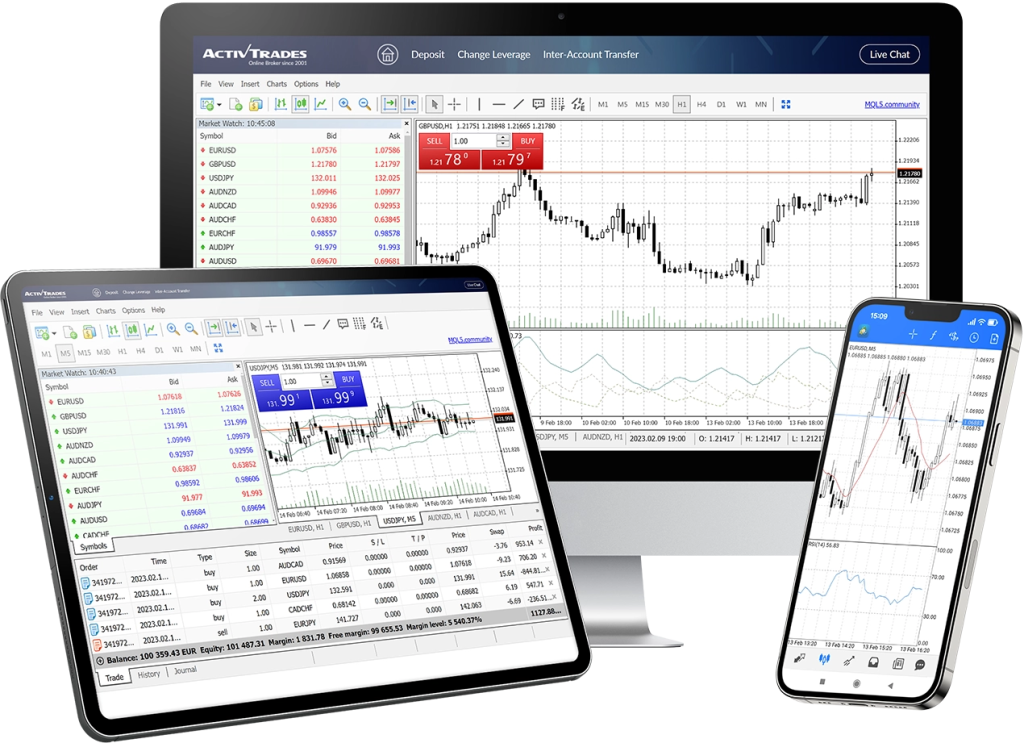Trade ETFs with any size of account
No hidden fees for opening or closing trades
ETF CFDs allow for both long and short positions
All client deposits are insured and held in segregated accounts
With customer satisfaction rate over 95%
Your profits are instantly available to you at all times

Trade forex on our exclusive next generation trading platform


| EURUSD | GBPUSD |
| USDJPY | and more |

| EURUSD | GBPUSD |
| USDJPY | and more |

| EURUSD | GBPUSD |
| USDJPY | and more |

| EURUSD | GBPUSD |
| USDJPY | and more |

| EURUSD | GBPUSD |
| USDJPY | and more |

| EURUSD | GBPUSD |
| USDJPY | and more |

| EURUSD | GBPUSD |
| USDJPY | and more |
An ETF, or exchange traded fund, is a type of investment fund that’s traded over an exchange, like an ordinary stock. These funds work by having an investment thesis of their own (e.g. green energy, or disruptive technology) which they use as a guide to purchase assets that fit into that specific thesis.
An ETF can hold all manner of assets in its portfolio including stocks, bonds, currencies, commodities, crypto, and more. In this way, when you purchase the ETF, your capital is proportionally exposed to all the underlying assets that the ETF owns.
The ETF itself tries to maintain its valuation at a level that’s comparable to the net asset value of all the assets it holds, however, depending on the sector, it’s not unheard of to have ETFs trade at a premium when compared to the assets held.
The real value of ETFs is that they allow investors to allocate capital to specific “themes” without having to trade the underlying assets they hold. ESG (Environmental, Social, and Governance) ETFs are an example of an investment that follows a specific philosophy. The same goes for crypto or emerging market ETFs.
One of the most obvious benefits is that ETFs are probably the most cost-effective way to expose your account to all those underlying securities held by the ETF in question.
Another benefit is the diversification offered by ETF investing. Rather than having your account exposed to the fortunes of a handful of securities that you’re trading individually, an ETF allows you to passively allocate capital to a large number at once.
Furthermore, when trading an ETF (or indeed an index), you only have a single trade to manage.
In addition, ETFs also distribute the dividends of the underlying securities held in the ETF portfolio proportionally to its investors, and there may also be some tax advantages to trading an ETF depending on your jurisdiction.
Finally, ETF investing is much more suited to beginners, due to the inherent diversification of the product.
ETFs are generally regarded as being far more transparent than mutual funds on a number of fronts. The precise mix of securities held by an ETF is published every single day, so as an investor you can know exactly what you are holding. Mutual funds, on the other hand, only publish their holdings once per quarter, which means that you can never really be sure of the exact asset mix you’re investing because by the time it is published, it can already be out of date.
ETFs are also more transparent in terms of costs, due to the fact that all the costs of trading are present in the spread, plus the commissions paid by the trader. This means that the activities of any one investor do not affect the rest. The same cannot be said of mutual funds, where the trading costs related to inflows and outflows are borne by all the individual investors of the fund in question. The exchange-traded nature of an ETF means that its fee structure is far more transparent to investors than that of a mutual fund, which is not traded over an exchange.
Finally, ETFs are also thought to be more liquid than mutual funds since they are traded over an exchange. This means that an ETF can be bought and sold all day long, whereas, in the case of mutual funds, you are purchasing directly from the issuer, not the market itself, at the relevant price at the day’s end.